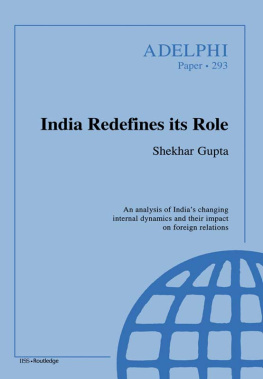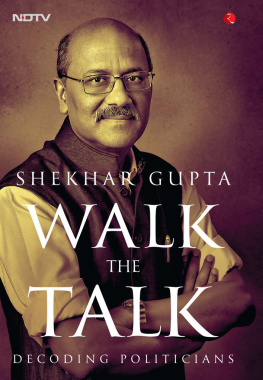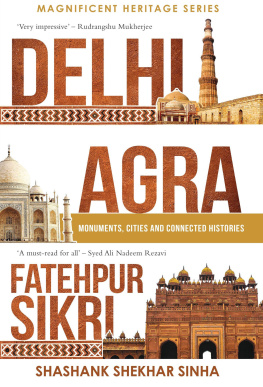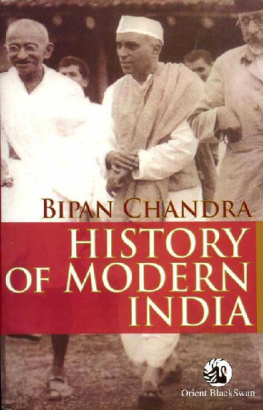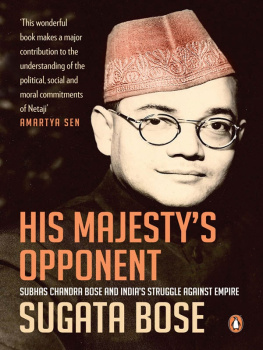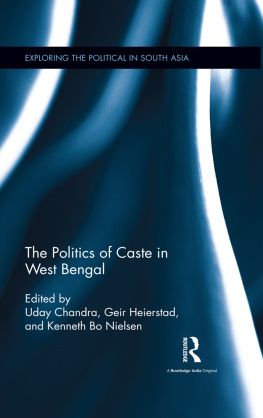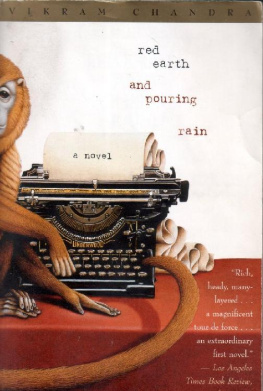Harivansh - Chandra Shekhar: The Last Icon of Ideological Politics
Here you can read online Harivansh - Chandra Shekhar: The Last Icon of Ideological Politics full text of the book (entire story) in english for free. Download pdf and epub, get meaning, cover and reviews about this ebook. year: 2019, publisher: Rupa Publications India, genre: Non-fiction. Description of the work, (preface) as well as reviews are available. Best literature library LitArk.com created for fans of good reading and offers a wide selection of genres:
Romance novel
Science fiction
Adventure
Detective
Science
History
Home and family
Prose
Art
Politics
Computer
Non-fiction
Religion
Business
Children
Humor
Choose a favorite category and find really read worthwhile books. Enjoy immersion in the world of imagination, feel the emotions of the characters or learn something new for yourself, make an fascinating discovery.
- Book:Chandra Shekhar: The Last Icon of Ideological Politics
- Author:
- Publisher:Rupa Publications India
- Genre:
- Year:2019
- Rating:3 / 5
- Favourites:Add to favourites
- Your mark:
- 60
- 1
- 2
- 3
- 4
- 5
Chandra Shekhar: The Last Icon of Ideological Politics: summary, description and annotation
We offer to read an annotation, description, summary or preface (depends on what the author of the book "Chandra Shekhar: The Last Icon of Ideological Politics" wrote himself). If you haven't found the necessary information about the book — write in the comments, we will try to find it.
Harivansh: author's other books
Who wrote Chandra Shekhar: The Last Icon of Ideological Politics? Find out the surname, the name of the author of the book and a list of all author's works by series.
Chandra Shekhar: The Last Icon of Ideological Politics — read online for free the complete book (whole text) full work
Below is the text of the book, divided by pages. System saving the place of the last page read, allows you to conveniently read the book "Chandra Shekhar: The Last Icon of Ideological Politics" online for free, without having to search again every time where you left off. Put a bookmark, and you can go to the page where you finished reading at any time.
Font size:
Interval:
Bookmark:
CHANDRA
SHEKHAR

Published by
Rupa Publications India Pvt. Ltd 2019
7/16, Ansari Road, Daryaganj
New Delhi 110002
Copyright Harivansh and Ravi Dutt Bajpai 2019
Photograph courtesy: Neeraj Shekhar
The views and opinions expressed in this book are the authors own and the facts are as reported by them which have been verified to the extent possible, and the publishers are not in any way liable for the same. Names of some people have been changed to protect their privacy.
All rights reserved.
No part of this publication may be reproduced, transmitted, or stored in a retrieval system, in any form or by any means, electronic, mechanical, photocopying, recording or otherwise, without the prior permission of the publisher.
ISBN: 978-93-5333-401-7
First impression 2019
10 9 8 7 6 5 4 3 2 1
The moral right of the authors have been asserted.
This book is sold subject to the condition that it shall not, by way of trade or otherwise, be lent, resold, hired out, or otherwise circulated, without the publishers prior consent, in any form of binding or cover other than that in which it is published.
in memoriam
Chandra Shekhar
(17 April 19278 July 2007)

Khula khelo sansaar mein, bandh sake nahin koye,
Ghaat jakaat kyaa kare, jo sir bojh na hoye.
Lead an unfettered life, then no one can bind you down,
If you travel light, then the fee collector can only frown.
Veteran Congress leader, Dwarka Prasad Mishra recited the above couplet, in the last Congress Working Committee meeting he attended just before the declaration of Emergency. It was the time when Chandra Shekhar had come out in open defiance, mounting an ideological challenge against the Congress leadership for not fulfilling its promise of ending poverty. He was advocating a dialogue between Jayaprakash Narayan (JP) and Indira Gandhi to resolve the crisis emerging out of the Bihar movement. Mishra addressed all the Working Committee members and said that Kabirs words reminded him of Chandra Shekhar. It was Mishras deep appreciation of Chandra Shekhars personality and a message to his Congress colleagues that people-centric politics required an unselfish commitment and a life free of personal ambitions and desires.

Chaah gayee chintaa miti, manua beparvaah;
Jaako kachhunaa chahiye, vah saahan ke sah.
By escaping desires, worries disappear,
and the heart is freed of strings;
One who does not crave for anything,
Indeed is the emperor of all the kings.
Dwarka Prasad Mishra, then, counselled Chandra Shekhar with the above couplet from Kabir, reminding him that the path he had chosen required him to travel without any baggage on his back.
There can be no better tribute to the life and political career of Chandra Shekhar.
Contents

Pranab Mukherjee
Foreword
Shri Chandra Shekhar, the eighth Prime Minister of India, was one of the tallest leaders of his times, who closely witnessed Indias journey as an independent nation and shaped its political landscape. An unquestionable idealist, a leader with his fingers on the pulse of the people, he believed that ultimate answers lay with the people themselves. His commitment to the dispossessed and his frequent padayatras aimed at establishing a direct dialogue with the people remained a matter of faith for him throughout. He comprehended the sociopolitical landscape of the country like few others.
A socialist and a Congressman later, Chandra Shekharjis political zenith was achieved when as the president of the Janata Party, he led it to victory to form the first Non-Congress government in the country in 1977. A parliamentarian of long standing, he remained a member of either Houses of the Parliament continuously from 1962 to 1984 and thereafter from 1989 to 2004. He achieved his parliamentary/administrative pinnacle as Prime Minister of the Republic in 1991. Though he headed a short-lived lame duck government, he steered the nation as a statesman in extremely difficult times, when the economy had nosedived, the polity was unprecedentedly fractured and a former prime minister had been brutally assassinated.
I had the opportunity of working closely with Shri Chandra Shekhar, when he was in the Congress Party and in the Parliament. Though often on different sides of the political divide, our views and opinions converged when it came to people-centric economic policies or his approach towards strengthening the Indian polity and democracy. Be it abolition of privy purse, nationalization of banks and coal mines or the Congress Partys economic resolution of 1969, I was on the same side of the ideological spectrum as the Young Turk. Standing against politics of personality, his unique leadership style is an inspiration for the youth as well as the political class of the country. His emphasis on well-researched articles on issues of national importance, for a free and fair democratic debate, was one of the traits I admired the most. A pragmatic politician, within the parameters of socialist ideology, he never claimed to be a theorist of socialism.
He had a unique way of expressing his thoughts and ideas as a writer, an editor and as a leader in the traditional and public gatherings. I have always marvelled at the consistency of his concerns and thoughts, which were always directed towards the interest of the nation, especially the downtrodden.
This book, written in simple language, has attempted to and succeeded in lucidly elucidating the finer details and nuances of Shri Chandra Shekhars life and times.
The author of this book, Shri Harivansh, now Deputy Chairman of the Rajya Sabha, has himself had an inspiring life. Starting his career as a journalist, he faced many challenges and numerous struggles which eventually led him to becoming the Additional Media Advisor to the then Prime Minister Shri Chandra Shekhar. After his exemplary contribution in journalism as a scholar and a formidable editor, he has now ventured into the realm of politics. As one can ascertain from this book, his keen observations on public life, its institutions and political process make him an insightful commentator and a formidable author. I admire his sincerity in bringing out a well-researched biographical account of Shri Chandra Shekhar. The efforts and earnestness of Shri Harivansh in painstakingly compiling the life story of the Young Turk, Shri Chandra Shekhar in carefully planned seven chapters, will be a delight to his readers.
I sincerely believe and hope that this book will be widely appreciated and read. I wish the author my best for his future and wish him success in his journalistic, scholary and political endeavours.

Pranab Mukherjee
(Former President of India)
Preface
In most popular or scholarly writings in English on the political history of independent India, Chandra Shekhar would hardly find a mention, not even in a footnote. It should not come as a surprise as he was neither a loyal foot soldier of Indias first family, nor did he command a loyal army of foot soldiers to look after his publicity campaign, image management and propagation of his legacy. Independent India has witnessed only three individualsLal Bahadur Shastri, Chandra Shekhar and Narendra Modiwho started from humble origins and succeeded in holding the highest political office in the land. The elite sections of Indian society have a tendency to undermine people from Hindi-speaking regions, and this patent arrogance of the privileged class has denied the likes of Acharya Narendra Dev, Madan Mohan Malviya or Sampurnanand their due stature and place in history. Instead, these stalwarts of the freedom movement have been portrayed as right-wing reactionaries, as if only an exclusive class of people could practise ideas of liberalism, secularism and universalism.
Next pageFont size:
Interval:
Bookmark:
Similar books «Chandra Shekhar: The Last Icon of Ideological Politics»
Look at similar books to Chandra Shekhar: The Last Icon of Ideological Politics. We have selected literature similar in name and meaning in the hope of providing readers with more options to find new, interesting, not yet read works.
Discussion, reviews of the book Chandra Shekhar: The Last Icon of Ideological Politics and just readers' own opinions. Leave your comments, write what you think about the work, its meaning or the main characters. Specify what exactly you liked and what you didn't like, and why you think so.

